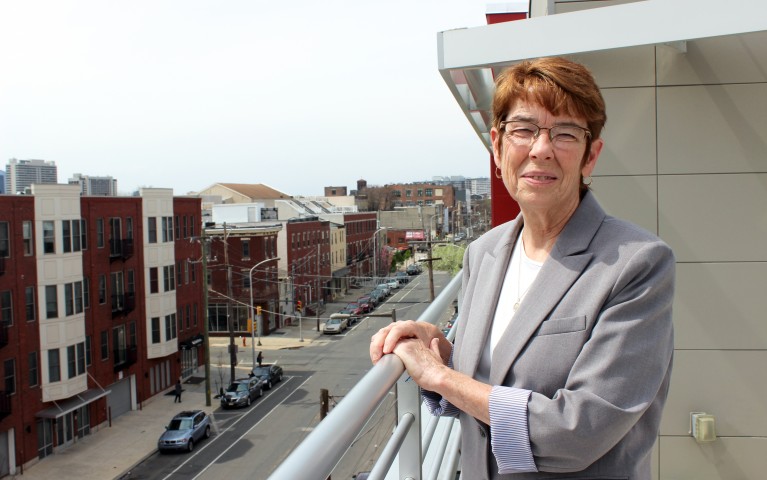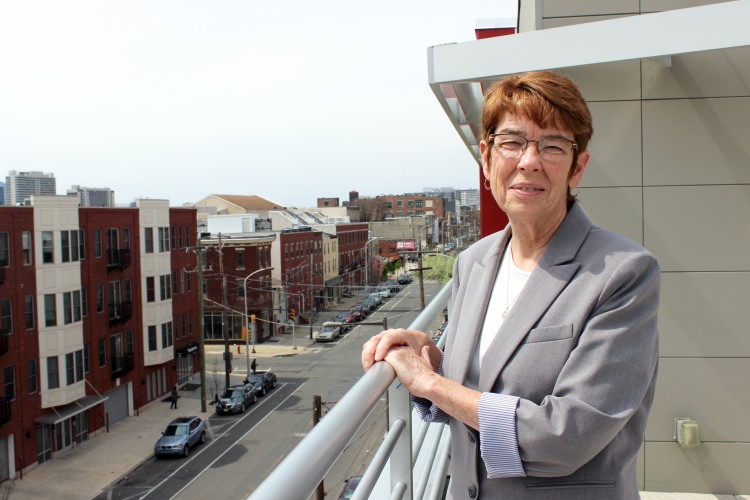We Can End Homelessness | Part Two

This is the second of two parts of a talk given by Sister Mary Scullion to a group of Chester County officials, service providers, advocates, and other stakeholders to encourage them in the development of a Ten-Year Plan to Prevent and End Homelessness. The first part was posted on March 15.
What makes it realistic to talk about ending homelessness is the existence of a very real community of hope – people from all walks of life who find some way to contribute and to be part of the solution. As people come to understand the issues, they want to get involved, and we need to be able to show persons and organizations what concrete roles they can play. We need to creatively find the outlets for persons’ and organizations’ gifts and energy and expertise.
Can professors and students in a local business school help us develop marketing plans for new businesses that can provide jobs for persons breaking the cycle of homelessness? Can local universities find internships and placements, not just for social work students, but for urban planners, architects, education students, in programs that can use their skills to work on policies, property development, and education supports? Can local businesses help us work with young persons in low-income neighborhoods through mentoring and apprenticeships as ways to strengthen their skills, foster better economic possibilities, and prevent future homelessness? Can our religious congregations tap their powerful spiritual and moral traditions to harness energy and vision and help offer humane and caring services and advocacy?
The answer to all of these is yes. And, our experience has continually shown us, it’s not simply homeless persons who benefit: Invariably, these organizations, schools, businesses, and congregations are also enriched. We also need to nurture real leadership – but we must open our eyes to many forms of leadership among all kinds of people at every level. Persons who have experienced homelessness must be part of the solution. Their life stories are invaluable in helping us understand the realities of homelessness and what kinds of solutions work best. Their passion, courage, and resilience must be our guideposts along the way.
The vision of Project HOME was developed in large part by the men in our first emergency winter shelter 20 years ago. At that time, our first concern was saving these men’s lives by getting them inside. Over those months, we dialogued with the men about what solutions were possible, and they helped us identify the building blocks of our program: housing, opportunities for employment, medical care, and education. Over the years, our residents’ input has helped strengthen our programs and clarify our vision.
Without the constant input and leadership of men and women who have experienced homelessness, our 10-year plans become bureaucratic reports on shelves, and our meetings and consultations just a lot of professional talk. Another hopeful sign is when people who might normally be in opposition to each other find common ground. For instance, homeless advocates and business persons have been pitted as adversaries – those of us who care about the issue of homelessness have sometimes been guilty of painting those in the chambers of commerce as cruel and inhumane, whose only interest is to pass anti-homeless legislation to forcibly remove persons off the streets.
Homeless advocates have been pigeon-holed as caring only about the civil rights of homeless persons to stay on the streets, with little concern for the health of the broader community. But in fact we can and must see each other as allies. Many in the business community are caring and humane. They also understand, sometimes better than politicians, that cost-effective and humane solutions can be a win-win situation. The fact is, we have much common ground. We all want to get homeless persons off the streets. We can come together in the conviction that we all desire for our downtowns and our neighborhoods to be safe, sanitary environments. We should all advocate for a quality of life for everyone.
Procuring quality housing and services for homeless persons and supporting commerce and tourism do not need to be mutually exclusive: In fact, both are critical in helping our urban communities flourish. In fact, perhaps the most important – and most hopeful – lesson we have learned over the past three decades is this: Our efforts to solve homelessness are good for the entire community.
When we invest in effective permanent supportive housing to help people get off the streets, we save millions of dollars otherwise spent on emergency rooms, police and court costs, endless rounds of detox and psychiatric hospitalizations. When we develop permanent housing and economic supports to help homeless families move out of shelter and toward self-sufficiency, we save the costs of dead-end shelters. When we empower individuals and families to break the cycle of homelessness, we create productive and contributing citizens. Two reports commissioned by Project HOME bear this out.
A 2007 economic analysis (the follow up report from 2011 can be found here) showed that the Philadelphia neighborhoods in which a Project HOME residence is located experienced a higher rate of property value increase than in the city in general. Other studies have shown similar findings: that supportive housing programs do not result in decrease property values, but in fact are correlated to increased property values, and therefore have a financial benefit to the city. Likewise, a report we released last year entitled "Saving Money, Saving Lives" also showed that investment in permanent supportive housing actually saves money for municipalities in the long run. We have substantial data which clearly shows that creating solutions to homelessness is actually cost effective – which is surely good news for local governments. We cannot allow ourselves to say that homelessness and poverty are too expensive to fix. Rather, they are too expensive not to fix.
One way or another, we are paying for them – in human lives and in social resources. Our cities can never fully flourish, our economies can never by truly vibrant, our civic health is never truly stable, when we allow so many of our fellow citizens to suffer. Making a serious commitment to working to end homelessness is a tremendously positive step. I believe it is a morally conscientious decision – and at the same time it simply makes good political sense. I believe it is a spiritually significant, compassionate, and humane commitment – and at the same time it is practically speaking an effective use of policies and resources.
This is the good news: We can make our communities more stable, economically healthy, and vibrant places for all our citizens – and in the process, I believe we become more fully human.
